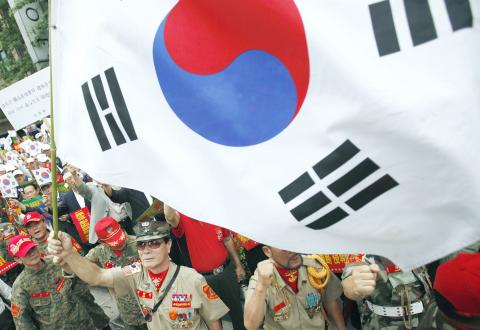Japan yesterday refused to take back a letter sent by its own prime minister after Seoul said it would not accept delivery of the note, as a row over islands threatened to descend into diplomatic farce.
It was the latest move in an increasingly bitter tit-for-tat dispute that has engulfed the two nations for nearly two weeks.
South Korea said earlier in the day it would return the protest from Japanese Prime Minister Yoshihiko Noda without answering it, for fear any move to acknowledge the missive would bolster Tokyo’s claim to islands that both sides say they own.

Photo: Reuters
That sparked an angry response from Tokyo, which accused its neighbor of contravening diplomatic norms.
“Under usual protocol, it is inconceivable that letters exchanged between leaders are sent back,” Japanese Chief Cabinet Secretary Osamu Fujimura, the government’s top spokesman, told a news conference.
“I hope [South Korean President Lee Myung-bak] will accept the letter, which was sent to deliver our prime minister’s thoughts,” he said.
The letter to Lee has not even made it to Seoul, having been kept at the South’s embassy in Tokyo, foreign ministry spokesman Cho Tai-young said, announcing the intention to hand the note back.
However, in what was beginning to look like a real live game of hot potato, the Japanese foreign ministry turned away a South Korean diplomat, believed to have been carrying Noda’s letter, at the gate of the ministry building, NHK footage showed.
“I’m sorry to say this, but returning a diplomatic letter is below even being childish,” Japanese Senior Vice Foreign Minister Tsuyoshi Yamaguchi said at a press conference.
The letter was subsequently put in the post, registered delivery, a spokesman at the foreign ministry in Seoul said.
Despite their strong economic ties, the two countries have a frequently uneasy relationship, in which historical animosities constantly play in the background.
That relationship has sharply worsened since Lee paid a surprise visit on Aug. 10 to the Seoul-controlled islands, known as Dokdo in Korean and Takeshima in Japan.
He said his trip, the first by a South Korean president, was intended to press Japan to settle grievances left over from its colonial rule in Korea from 1910-1945.
Lee further angered Japan by saying later that Emperor Akihito must sincerely apologize for past excesses should he wish to visit South Korea.
Noda’s letter said Lee’s visit to the islands and his call on the emperor were “regrettable,” Kyodo News said.
Noda upped the ante in Tokyo yesterday, telling lawmakers Lee’s remark “considerably deviates from common sense” and the president “should apologize for and retract it.”
He said Japan was keeping a cool head, but Seoul needed to calm down.
Tokyo, caught on the hop by the island visit, recalled its ambassador to Seoul, canceled a planned visit by its finance minister scheduled for this month and said it would review a foreign exchange swap accord.

Incumbent Ecuadoran President Daniel Noboa on Sunday claimed a runaway victory in the nation’s presidential election, after voters endorsed the young leader’s “iron fist” approach to rampant cartel violence. With more than 90 percent of the votes counted, the National Election Council said Noboa had an unassailable 12-point lead over his leftist rival Luisa Gonzalez. Official results showed Noboa with 56 percent of the vote, against Gonzalez’s 44 percent — a far bigger winning margin than expected after a virtual tie in the first round. Speaking to jubilant supporters in his hometown of Olon, the 37-year-old president claimed a “historic victory.” “A huge hug

Two Belgian teenagers on Tuesday were charged with wildlife piracy after they were found with thousands of ants packed in test tubes in what Kenyan authorities said was part of a trend in trafficking smaller and lesser-known species. Lornoy David and Seppe Lodewijckx, two 19-year-olds who were arrested on April 5 with 5,000 ants at a guest house, appeared distraught during their appearance before a magistrate in Nairobi and were comforted in the courtroom by relatives. They told the magistrate that they were collecting the ants for fun and did not know that it was illegal. In a separate criminal case, Kenyan Dennis

A judge in Bangladesh issued an arrest warrant for the British member of parliament and former British economic secretary to the treasury Tulip Siddiq, who is a niece of former Bangladeshi prime minister Sheikh Hasina, who was ousted in August last year in a mass uprising that ended her 15-year rule. The Bangladeshi Anti-Corruption Commission has been investigating allegations against Siddiq that she and her family members, including Hasina, illegally received land in a state-owned township project near Dhaka, the capital. Senior Special Judge of Dhaka Metropolitan Zakir Hossain passed the order on Sunday, after considering charges in three separate cases filed

APPORTIONING BLAME: The US president said that there were ‘millions of people dead because of three people’ — Vladimir Putin, Joe Biden and Volodymyr Zelenskiy US President Donald Trump on Monday resumed his attempts to blame Ukrainian President Volodymyr Zelenskiy for Russia’s invasion, falsely accusing him of responsibility for “millions” of deaths. Trump — who had a blazing public row in the Oval Office with Zelenskiy six weeks ago — said the Ukranian shared the blame with Russian President Vladimir Putin, who ordered the February 2022 invasion, and then-US president Joe Biden. Trump told reporters that there were “millions of people dead because of three people.” “Let’s say Putin No. 1, but let’s say Biden, who had no idea what the hell he was doing, No. 2, and